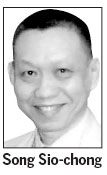Find a better solution to fill up legislative vacancies
Updated: 2011-06-03 08:19
By Song Sio-Chong(HK Edition)
|
|||||||

On a television broadcast of a Legislative Council (LegCo) meeting, Stephen Lam, the head of Constitutional and Mainland Affairs Bureau, explained the substitution method which is to replace by-elections when there are LegCo vacancies in the city's geographical constituencies.
Lam's explanation, of the new system which is to prevent any further "de facto" referendums from taking place, came under attack by Margaret Ng, a lawmaker from the Civic Party. She charged that the arrangement discriminates against people who died or resigned their post for other personal reasons. Her party directly supported last year's "resignation and referendum" movement. Ng's stance may be likened to someone who prefers to enter a hall the back way. He will inevitably complain using the names of others when the backdoor is closed.
Madam Ng has also confused effect with cause. The effect of the new amendment indeed is intended to prevent some agencies to resign so as to force a "de facto referendum" in a subsequent by-election.

As to the true reason for the amendment, it is not directed against the Civic Party and the League of Social Democrats. By-elections are suitable only where there are small, single seat constituencies. They are not suitable when there are much larger constituencies in which elections are carried out by proportional representation. When there is a single seat left vacant, direct substitution of the candidate polling the next highest number of votes in the previous election is more effective than a by-election. That is the government's position. Other people argue that the candidate who polled immediately below the vacating member of the same list, should be named in substitution. Others even want the party of the vacating candidate to have the right to nominate the replacement.
Hong Kong residents have freedom of expression, obviously. Equally as obvious is that not all suggestions are workable. For example, there were several candidate lists with but a single candidate in the 2008 geographical constituencies general election. It will be unfair to them if next in the list method is adopted. Next to the votes will be better.
There have been irregularities in Hong Kong elections. Opposing the common practice to have one list in one constituency, the Democratic Party ineptly made several lists. In the 2008 direct election of the LegCo geographical constituencies, Democratic Party had three lists in New Territories West, namely HO Chun Yan list (3 candidates), CHEUNG Yin Tung list (2 candidates) and LEE Wing Tat list (5 candidates); and in New Territories East, there were LAU Wai Hing list (2 candidates, LAU joined the party later), WONG Sing Chi list (2 candidates) and CHENG Kar Foo list (7 candidates). In the event of a vacancy occurring in one constituency, there would be a quarrel among different lists of the Democratic Party. The proposal would also be unfair to other candidates on other lists.
In the 2004 direct election for the LegCo geographical constituencies, there was a list of CHENG Kar Foo (7 candidates) which had the largest amount of votes of 168,833 among all 35 lists of five constituencies in that election. Among seven candidates of the list, there were at least four political parties, and who would be the proper person to substitute would be a problem in such a case.
What will happen if there is only one candidate in the aforementioned list? Under the present Legislation Council Ordinance and its subsidiary regulations, the Returning Officer of the election must publicly declare the election has failed or has failed to the extent that the number of candidate returned at the election for the constituency was less than the numbers to be returned for the constituency. In this case, re-election of this constituency may be required.
But in my opinion, the substitution method as discussed at the beginning of this article may also apply, and the cost for re-election will be saved. At last, we have found another advantage of the substitution method at least.
The author is a current affairs commentator.
(HK Edition 06/03/2011 page2)